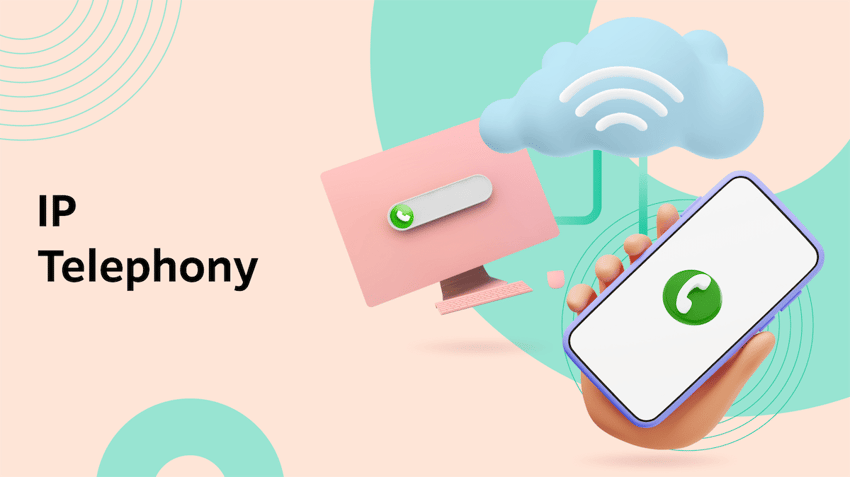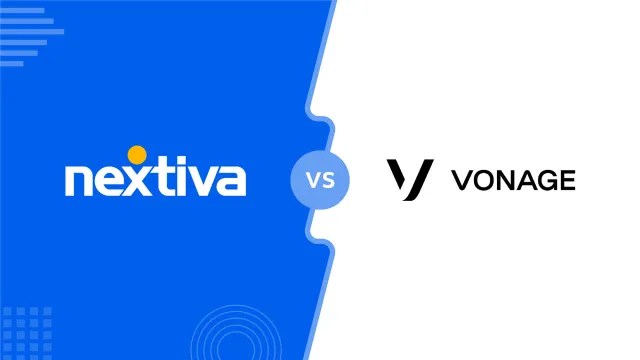What Is VoIP?
VoIP is a communications technology that enables you to make phone calls using your broadband connection instead of landline service. VoIP stands for Voice over Internet Protocol, an open standard for establishing calls over the Internet. Some may also refer to VoIP as Voice over IP.
A typical setup involves a router for the internet with a handset connected. The handset or business phone system uses the internet to transmit your speech, like a physical landline would. The only difference is that the underlying technology isn’t a landline but the Internet.
Business phone providers use Voice over IP (VoIP) to deliver telephone services to customers, eliminating the need for them to install and maintain physical phone lines and equipment. VoIP helps make and receive high-quality calls and offers advanced features not usually available on landline service.

Start calling for just $15/mo.
See why over 100,000 businesses switched to Nextiva. Now you can get it all for $15/month per user.
How Does VoIP Work?
VoIP converts your voice from a standard phone signal into a compressed digital signal. It then sends digital data in small “packets” over the internet. A VoIP service provider helps manage the connection between you and the person you’re calling. The process happens almost instantly.
Here’s a basic breakdown of the steps involved:
- Your IP phone or VoIP app connects to the router on your Local Area Network (LAN).
- When you dial a phone number, your phone tells your VoIP service provider to connect the call.
- The provider establishes the call and exchanges data packets from your phone.
- Your VoIP phone converts these incoming digital packets back into clear audio you can hear.
This entire process bypasses the public switched telephone network (PSTN). VoIP systems are built on open standards like Session Initiation Protocol (SIP). IP telephony ensures that different desk phones, conference phones, and VoIP apps can all work together optimally.
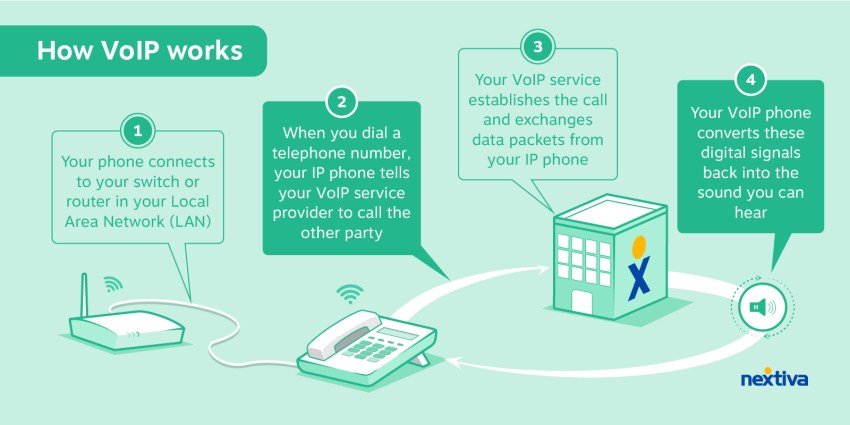
What Is the Difference Between VoIP and Landline Phones?
The main difference between VoIP and a landline is the underlying technology: VoIP uses the internet, while landlines use a legacy copper line telephone network. Because VoIP is cloud-based, no on-site hardware management is required. Adding a new user is accomplished through a simple software change and doesn’t require a technician call.
Businesses prefer VoIP because it offers a better calling standard and a wider range of features without the need to set up an expensive on-premises private branch exchange (PBX).
Here are some key differences when comparing VoIP vs. landline:
| Functionality | VoIP | Landlines |
|---|---|---|
| Phone calls (PSTN) | Yes | Yes |
| Nationwide long-distance | Included | Optional |
| User-to-user calls | Yes | PBX required |
| Caller ID | Yes | Yes |
| Call Waiting | Yes | Yes |
| Ease of setup | ★★★★★ | ★★★ |
| Requires internet | Yes, 100 Kbps per line | No |
| Wireless | Wi-Fi, DECT, and Bluetooth headsets are available | DECT and Bluetooth headsets are available |
| Reliability during internet/ power outages | Calls can be routed to another number or voicemail. | Calls drop or are routed to voicemail. |
| Technology | IP telephony (SIP, TLS, and SRTP) | Analog voice signals |
| Call quality | ★★★★★ | ★★★★ |
| Setup cost | $0 | $110 per jack |
| Monthly cost | $15 –$60 | $35 |
| Advanced features | ||
| Auto attendant | Included | PBX required |
| Phone number privacy | Included | Varies |
| Phone number changes | Included | $27 |
| Phone extensions & hunt groups | Included | PBX required |
| Conferencing | Included | Three-Way Calling |
| Call routing | Included | $9.95/mo |
| Call queuing | Add-on | Add-on |
| Remote work capable | Yes, softphone apps | Call forwarding |
| Call encryption | Yes (TLS & SRTP) | No |
| International dialing | MX: $0.16/min UK: $0.01/min JP: $0.05/min | MX: $1.97/min UK: $1.21/min JP: $1.62/min |
| Business voicemail | Included | $13.95/mo |
| Integrations (CRM, text messaging, surveys) | Yes | No |
Consider switching from traditional phones to VoIP if:
- Your country plans to discontinue landline phones
- Your sound quality is poor
- You need advanced functionality
- Your on-site PBX contract is expiring
- You’re moving to remote or hybrid work
- You’re paying too much for external calls
- You’re paying too much for long-distance international calls
What Equipment Do You Need to Set Up VoIP?
For a small setup, you only need a subscription to your business VoIP provider and a device to make calls to get set up for the first time. This device could be a desk phone, a softphone on your laptop, or a VoIP app on your mobile phone.
Assuming you already have a broadband connection and a router, you don’t need any other VoIP equipment.
If you manage VoIP for your enterprise, you may use a separate firewall or switch from your router. If you have analog phones or other devices you wish to retain, use an analog telephone adapter (ATA). These small adapters connect your VoIP solution to traditional telephone services and devices, such as old fax machines and alarm systems.

How To Switch to VoIP
Making the move to VoIP is easier than you might think. Here’s a simple step-by-step guide to help you get started:
Check your internet connection
VoIP runs over your internet, so a stable, high-speed internet service is essential. Your network must be able to handle voice traffic without compromising quality and provide enough bandwidth for simultaneous incoming calls. Run a VoIP quality test to make sure you’re ready.
Choose your provider and plan
Choose a VoIP service provider with a good reputation and customer support that fits your business size. Consider your number of users and key features (call recording, video conferencing, auto-attendant) to pick a plan that meets your needs without paying for features you don’t use.
Keep your business number (number porting)
You don’t need to change your current phone number. Your existing business number can be ported to your new VoIP service — a standard process handled by your provider, which makes sure your customers can reach you without interruption.
Set up your phones
Choose from several options: use physical IP phones with an internet connection, install your provider’s softphone app on computers or smartphones, or use both. Setup is quick and requires minimal hardware.
Configure your system and train your team
Set up VoIP features like call forwarding, auto-attendant, and custom voicemail messages. Once up and running, train your team on effectively using the system. Most VoIP interfaces are intuitive, but a quick training session will help everyone get up to speed quickly.
Advantages of VoIP
VoIP offers first-class phone services at a fraction of the cost of a landline. But those aren’t the only advantages. Here are the key benefits of VoIP that make it an essential upgrade for businesses:
- Lower pricing: Reduces call costs with internal and internet calling by up to 50%; reduces on-site maintenance and repair costs, too.
- High-quality sound: Internet connectivity enables HD call quality; management tools check for potential network issues.
- Advanced features: Offers premium features like auto attendants, call recording, and call queues, without having businesses install expensive add-ons.
- Cheap international calls: International long-distance rates are as low as $0.04 per minute to call Mexico or $0.01 to reach the United Kingdom.
- Fast deployment: Only takes an internet connection and a softphone or handset to set up.
- Remote-friendly: Use your phone service wherever you work. No technical setup is necessary if you work from home.
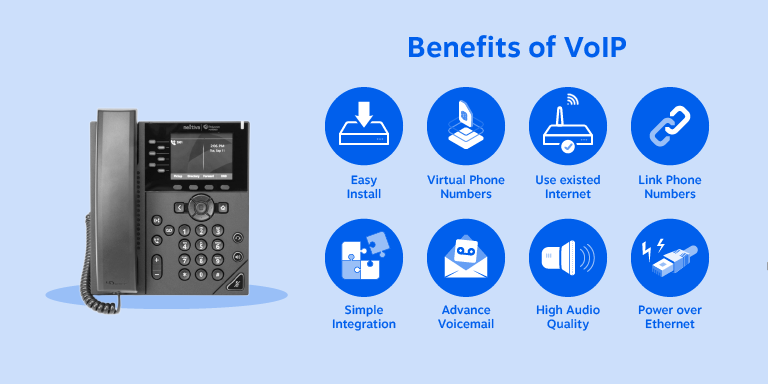
Desk phones aren’t expensive; you can even get them free from your VoIP service provider. Plus, they often include a mobile app you can use on your desktop or mobile device to make calls instead of using a traditional handset.
Disadvantages of VoIP & How to Overcome Them
The only real downside of using VoIP instead of a traditional phone system is that you rely on your internet connection for call quality. It’s recommended to audit your internet connection before switching to VoIP. Here are some more roadblocks you can hit with VoIP and how to tackle them.
- Internet dependency: Call quality relies on your connection. Perform a VoIP quality test before switching to check latency, bandwidth, packet loss, and jitter.
- Internet outages: Set up automatic call forwarding rules that redirect calls to mobile numbers or backup locations during outages.
- Emergency services (911): VoIP uses Enhanced 911 (E911). Register your physical address during setup so dispatchers can locate you automatically.
- Power outages: Staff can continue business calls using the mobile VoIP app on smartphones over cellular networks (4G/5G), independent of office power.
When properly configured with backup solutions, VoIP’s benefits far outweigh its limitations. A stable internet connection unlocks cost savings and advanced features that traditional phone systems can’t match.
Best VoIP Phone System Features
What are the attractive features available with a cloud-based business phone system? Here are the most popular VoIP features that businesses will enjoy using.

1) Auto attendant
An auto attendant allows you to configure the options callers hear when they dial your business.
For example:
- Press option 1 for sales
- Press 2 for support
- For anything else, press 3
You can choose to route calls to specific departments or people best suited for a specific type of query. Because you can configure all VoIP components via a web browser, you can change them as often as you like, and no site visits are required.
2) Mobile and desktop apps
Mobile and desktop apps enable you to use your VoIP phone service without a VoIP handset.
VoIP apps are ideal for salespeople and technicians who work on the go, as well as remote workers who frequent coffee shops and co-working spaces. These apps ensure everyone in your company is reachable, no matter where they are.
Some also prefer headsets or mobile devices, so a handset is rarely used. When rolling out VoIP, check who needs a physical handset to see if you can save money upfront.
3) HD call quality
Thanks to codecs designed for high quality, every VoIP call over a stable internet connection benefits from HD call quality. You have crystal-clear conversations with colleagues and customers. At the same time, you’re seen as a reputable business that focuses on offering a quality customer communication experience.
4) Unified communications
Unified Communications as a Service (UCaaS) combines various communication methods, such as instant messaging, calls, and video conferencing, into a single platform. With features like call recording, reporting, and voicemail, Unified Communications is the next step up from VoIP.
Switching to VoIP opens up doors to improving your internal collaboration. If you plan on making video calls instead of regular phone calls in the future or like the idea of instant messages, VoIP is a great first step.
5) Call encryption and VoIP security
The internet is prone to security flaws. Any call made over the internet needs to be secure. Using VoIP means everything is encrypted in transit and at rest. No one has access to your conversations, only the metadata.
For example, you call a colleague in your office in Arizona. Call logs show the timestamp and duration of the call, but the content isn’t visible.
6) Call recording
VoIP goes a step further and lets you record calls in case you want your content monitored for quality or regulatory purposes. It offers basic call recording options, where calls are saved in a cloud-based portal, ready for download later. Nextiva is a leading VoIP example that supports these features.
You can also opt for advanced call recording, including features like sentiment analysis to flag unhappy customers or create upselling opportunities.
How Much Does VoIP Cost?
VoIP is surprisingly inexpensive when you consider all its capabilities. Arguably, it’s one of the biggest advantages over traditional phone lines.
The short answer is that you can expect to pay approximately $25 per user per month for VoIP. The cost savings are quite dramatic compared to a traditional phone system or on-premises PBX.
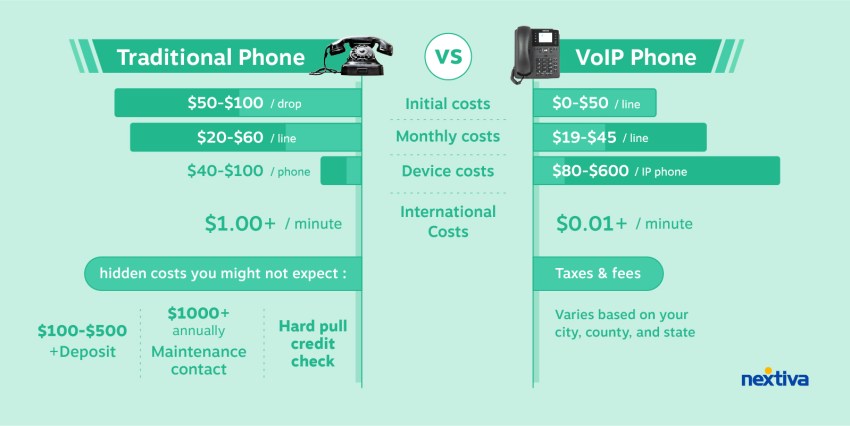
To give you an idea, here’s how much VoIP typically costs:
- Initial costs: $0-$60 per line
- Monthly costs: $15-$25 per line
- Device costs: $80-$600 per IP phone
- International calls: $0.01+ per minute
- Taxes and fees: Varies based on your city, county, and state
Traditional phone systems have hidden costs you might not expect:
- Installation fees: $50-100 per drop
- Deposit: $100-$500
- Maintenance contract: $1000+ annually
- International calls: $1.00+ per minute
- Credit check: Soft or hard pull
All this is to say that we strongly recommend you obtain a free quote to confirm the exact VoIP pricing.
Start calling for just $15/mo.
See why over 100,000 businesses switched to Nextiva. Now you can get it all for $15/month per user.
How To Choose the Right VoIP Provider
While most providers have a good handle on the basics of VoIP, it’s worth choosing a VoIP provider that best suits your needs.
If you’re a small business that just needs to convert your business phones to VoIP without any special capabilities, you need someone specializing in small business VoIP.
Choose a provider that ticks the right boxes, including:
- Implementation experience: Offers comprehensive support needed to configure advanced features like auto attendants and call queues, deploy physical handsets, conduct user training, and guide you on the optional hardware or software you need.
- Network compatibility: Compatible with your existing network or customizable to fit your network needs.
- Clients in a similar industry: Has helped similar companies like yours and holds proven success stories.
- World-class customer support: Provides round-the-clock or at least swift customer service, particularly for number porting, on-site setup, and ongoing support.
- High availability and security: Has proven reliability with minimal downtime, like Nextiva, providing 99.999% uptime with 24/7 monitoring. Every Nextiva data center meets the security standards set by the ISO/IEC 27001 certification.
Likewise, if you run a contact center, your VoIP provider needs to provide the entire telecommunications package. While you can decouple a VoIP phone system and a contact center, users love the single pane of glass experience. This is reflected in the G2 user rankings, where real people vote on which services they prefer.
For example, Nextiva won the Best Software Award in the annual G2 user rankings for its commitment to improved collaboration and productivity. Nextiva’s focus on UCaaS, which helps contact centers and enterprises unify various communications tools on one platform, is something to keep in mind when choosing a connected communications provider.

“The Nextiva team is dedicated to creating software that improves productivity and helps businesses enhance customer service. Our ranking on the Global Top Sellers list is recognition that our most important audience —customers —recognize the value we’re bringing daily.”
Chris Reaburn
🔒Learn more: Nextiva’s redundant network and stringent security standards
Verdict: Is VoIP Right for Your Business?
The short answer: Yes, for virtually every growing business.
VoIP isn’t just an upgrade to your phone system — it saves costs, makes your operations more flexible, and offers professional features that meet your customers’ growing needs. No matter if you’re a startup needing business communications on a budget, a remote team requiring unified connectivity, a customer service team looking for advanced call management, or an enterprise business needing scalability, VoIP adapts to your needs and grows with you.
The real question isn’t whether VoIP is right for you, but whether you can afford to use outdated technology while your competitors adopt superior communications tools. With minimal setup effort and proven ROI, VoIP has become the communications standard for businesses ready to work smarter, not harder.
Still Confused About Switching to VoIP?
For high-quality and easy-to-manage business communication, you need VoIP. And, soon, your hand may be forced.
With landline services being slowly phased out in parts of the US and UK, you need to start planning your switch to VoIP. The Federal Communications Commission (FCC) has announced that traditional landline phone services will be phased out. Due to the expensive maintenance of landline services, VoIP solutions will soon be your only option.
But there’s good news, too!
Moving to VoIP is so easy and productive that commercial real estate firm Franklin Street switched its 325-employee company from landline phones to Nextiva and reported 30% annual revenue growth.

Whether your goal is simply to keep up with technology or consciously upgrade to a feature-rich phone system, Nextiva offers the whole package you need to get started.
Don’t get caught up switching when it’s too late. Make the move to VoIP today.
Your search for VoIP is over. Try Nextiva.
Replace dozens of apps with Nextiva. Advanced calling features, collaboration and customer communications in one solution.
Analog to Digital: The (Short) History of VoIP
In the 1970s, researchers began exploring internet protocols to connect phone systems. At the time, long-distance calls were expensive, which led to innovations in real-time digital voice networks. In the 1990s, the first commercial VoIP applications emerged, allowing voice calls to be made directly from computers. Today, VoIP has largely replaced analog telephone lines, becoming a critical part of business communication systems.
Technical VoIP Terminology
As you can imagine, voice over IP involves several protocols and standards that are used to ensure phone calls are completed successfully and heard in crystal-clear call quality.
- SIP: Session Initiation Protocol. A widely used signaling protocol for managing multimedia sessions like voice/video calls.
- RTP: Real-time Transport Protocol. Encapsulates voice into IP packets for real-time audio/video transmission.
- SRTP: An encrypted version of RTP that provides security for voice/multimedia.
- VoIP codecs (G.711, G.722, G.729): A program that compresses and decompresses voice data. G.722, for example, is used for wideband HD Voice quality.
- TCP: Breaks messages into packets for reliable delivery over IP networks.
- QoS: Quality of Service. A method of prioritizing voice traffic on a network to ensure high-quality calls.
FAQs About VoIP
You’ve probably used VoIP without even knowing it. Services like Skype, WhatsApp calls, and Zoom all use VoIP technology to transmit your voice over the internet. A business VoIP service, like Nextiva, takes that same technology and builds a complete, professional phone system around it with features like business numbers, auto attendants, and call routing.
While some consumer apps that use VoIP are free (like WhatsApp), a business VoIP service is a paid subscription. The cost is low because it replaces your traditional phone bill and includes advanced features, unlimited calling, and customer support that free services don’t offer.
Yes, absolutely. You can transfer your existing business phone number to your new VoIP service through a standard, regulated process called “number porting.” This ensures you don’t lose the number your customers already know and trust.
Wi-Fi calling is a feature on your mobile phone that uses a Wi-Fi network to make regular calls when your cellular signal is weak. VoIP is a complete technology for a full phone system that can work over any internet connection (Wi-Fi or wired) and includes a wide range of business features beyond just making calls.
Wi-Fi calling is better if you’re an individual who just wants to make clearer personal calls on your cell phone when your voice signal is weak at home. VoIP is better if you’re a business that needs a professional, reliable, and feature-rich phone system that can handle business calls, build a professional image, and scale as you grow.
Yes! You can send and receive SMS and MMS-based messages and fax from your VoIP phone lines. Nextiva includes this feature at no additional charge with its popular business phone service plans. Why pay extra elsewhere?
Yes, these mobile devices like iPhones, Androids, and other tablets can use many popular Voice over IP phone providers without issue. Since 4G and 5G cellular signals are widely available with comparable speed to wired broadband, mobile phones act as additional VoIP devices.
To use your cell phone with VoIP, download the recommended softphone app, sign in with your credentials, grant it any permissions asked, and you’re all set to enjoy phone calls entirely over a Wi-Fi or cellular connection.


















 VoIP
VoIP 











